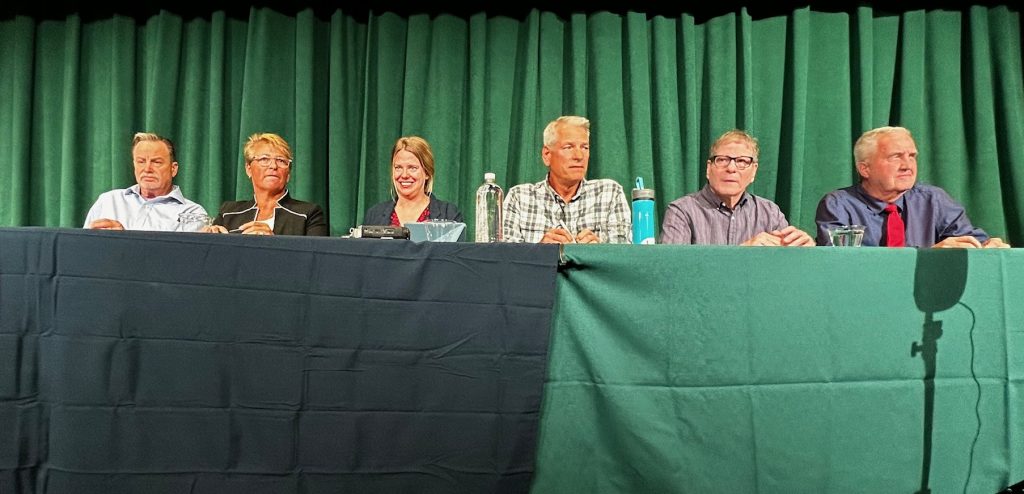All 6 IVGID candidates debate issues
Outsourcing, working relationships, rec assets, finances discussed
INCLINE VILLAGE, Nev. – At a debate at Incline High School on Monday, Nov. 30, hosted by the Incline Village Crystal Bay Community Forum and Incline Village Crystal Bay Community Business Association, all 6 candidates for 3 slots on the Incline Village General Improvement District (IVGID) Board of Trustees were against outsourcing its recreation facilities, the general manager position and/or administration to a management firm.
Outsourcing question
The question stems from an August presentation by Troon management firm to the IVGID board during its general manager search. Troon is known for being a major player in the hospitality and club industry with 35,000+ professionals worldwide and expertise in club operations, food and beverage, sales and marketing, finance and accounting, human resources, procurement, agronomy, legal, technology, retail, design and development, risk management, racquet sports, golf instruction, and HOAs.
Before the presentation, there was more than two hours of public comment by Incline Village and Crystal Bay residents who were opposed to outsourcing.
“Recreational facilities and administration, I would not outsource,” said Michelle Jezycki, who has 30+ years of human resources management and leadership experience. “I have been on the other side of outsourcing. I respond to RFPs (Request for Proposals) with my own company. We would be very naive to think that it’s not a for-profit business. And if we don’t have the wherewithal to hire the right GM for our district, we’re in the wrong business.”
As a board member, incumbent and political consultant Michaela Tonking learned about the process during Troon’s presentation.
“I do not believe it is the right choice because we as board members have … two jobs,” Tonking said. “We have to take care of our financial house. But also, we have an employee. And we have one employee, and it’s the GM. And I believe that we should be responsible of setting goals and measuring the performance of our own GM to make them fit the needs of this district. And so, for me, I’m no on that.”
Mick Homan, a retired retired Procter and Gamble finance executive, opposed it, too.
“I am categorically opposed to outsourcing the management of this district to a third party,” Homan said. “I think that would be a complete abdication of the board’s core responsibility and a commission of complete failure to do its most important job. Which is to hire and manage their only direct report, which is the GM.”
Mark Case, who has extensive management experience, agreed with his opponents.
“I unanimously agree with everybody here that we need to not outsource any departments,” Case said. “It can all be managed from within.”
Watchdog candidate Frank Wright cited a statistic.
“Outsourcing something that you own is putting yourself in a position to have someone else control you, pay for it, and then use it,” Wright said. “But when you have a venue that loses $600,000 within a three-month period, food and beverage, you’ve got to kind of wonder, are we doing something right? And especially when you’ve done it year after year after year. That’s a lot of money.”
Harry Swenson, a retired NASA scientist-executive, set the record straight.
“Outsourcing, I don’t believe in it,” said Swenson. “I have gone through that at NASA. It often is problematic because outsourcing, unless you do it well by knowing the contract … the way that that contract’s written, and having tight controls over that contract, outsourcing can often give you more problems than it’s worth.”
Harmonious working relationship
Moderator John Crockett asked the candidates how they would create a harmonious working relationship with fellow trustees
Tonking said she has learned from being in the minority on the board that there’s validity in everyone’s statement and ideas.
“I think something I’ve learned is that there’s still opportunity to see why someone chose that direction or why a vote may have failed that I was really passionate about, and to come up with better solutions in the future to really dig in together,” Tonking said. “… it’s really just trying to remember that each person sitting next to us is full of great ideas and has their own experiences and perceptions.”
Homan said he’s learned in his 40-year career is that no one is ever going to be in a situation where all your coworkers are people that you would have over for dinner and drinks.
“The key thing is that you need to make sure that you’re holding everybody accountable to doing the right thing for the district, for the residents, for the business, for whatever it is that you’re working on in the group setting that you’re in,” Homan said. “You’re not always going to agree, but you’ve got to put yourself out there. You’ve got to hold yourself accountable.”
Homan added that as long as “we’re all coming to the table with the right goal in mind of serving the constituents, then I think we’re going to be able to make that work.”
Case said working together, people need to find common ground.
“Everybody’s going to have different opinions,” Case said. “Everybody’s going to have a different view. It’s a matter of just working together to try and come together with that objective of a common goal.”
Wright said everyone understands different things, and that’s what we want in a community.
“When you have five different individuals, they bring to the table five different values, ideas, things that are going on,” Wright said. “The issue is trying to get those five people to work together. And you take five people that are willing to compromise, five people that are willing to listen to the other trustees, five people that will listen to the community and take their information, their input, and try to find some commonality in the table that can better our community.”
Wright took issue with three people running together.
“Why can’t you run on your own merits and your own morals and your own issues?” Wright asked. “Why do you have to join forces? … We want people that are self-thinking that will go out and do what they think is best and then come together as five (trustees) and come to a conclusion on what is best for our community. If three come in and they’re all going to vote the same way, that’s not good for our community. They’ve already talked about it. They’ve already associated with what they’re going to do. And the other two (trustees) have no idea. Does that kind of make you a good working board? I don’t think so.”
Swenson reverted to his 32 years at NASA where he worked his way up from a flight test engineer to scientist-executive.
“So, at NASA, I built many teams,” Swenson said. “I worked on many teams. And if you want to see arguments, see a bunch of diverse engineers arguing about the best way to do things. There’s never a best way. There’s a good way, and you’ve got to work through the solutions to find the best way.”
Swenson said at the beginning of team building, you must work to form common goals.
“If the goals aren’t well understood and common amongst your team members, you will not have a good working relationship,” Swenson said. “And those goals have to be maintained and built upon by all the team members. They all have to buy into those goals.”
Once those goals are bought into, Swenson said, then you can still have all the arguments you want, but you point out the facts from your perspective of how we’re going to achieve that goal.
Jezycki framed her experience as the senate’s Senior Education and Training Administrator, and Director of Human Resources.
“The United States Senate has 100 CEOs that all think they know how to run business,” Jezycki said. “Imagine the difficulty in dealing with all of these egos from all parties and having to teach them things like conflict management, team building exercises with their state staff as well as their D.C. staff, and the senator involved as well. Not an easy task, but I think I can bring those skills just like I did to the United States Senate to our awesome village here in Incline.”
Jezycki said IVGID trustees need to be “people that will check their ego at the door, let go of the special interests, and focus on our common goal, and that is to you, our community.”
Jezycki responded to Wright’s comments about running as a group backed by a PAC.
“I’m really glad you brought up the running for three together, because we’re not,” Jezycki said. “You’ll notice we’re each running our own campaigns, Mick, Michaela, and I.”
Jezycki explained community members started a PAC because they believed in the trio’s platforms.
“They’re different, and we won’t always agree,” Jezycki said. “But we’re not saying, end of the day, you must vote for all three … So, while that’s quite flattering and we appreciate the support, we are three individuals running for three seats that are available on the board.”
Recreation assets
Crockett’s next question was if IVGID’s recreation assets (ski, beaches, golf) should be profitable on a standalone basis or together as an entity.
“To be very clear, I have a strong view that our venues are a part of a portfolio of recreational venues that we make available to all of our community members,” Homan said. “I believe they provide community service to our residents. I believe that the portfolio provides a significant benefit to us as residents. Doesn’t mean that we shouldn’t be optimizing how they are operated.”
Homan added that IVGID should be optimizing the revenue streams, the cost structure, and so forth.
Wright said it is unclear where profits, losses and how much money is taken in because the board is not given monthly reports.
“The board has asked the managers to provide profit and loss expenses every month,” Wright said. “So far, I don’t think any reports have come in, and that was just recent.”
Wright said it is documented that food and beverage has lost a ton.
“We know golf loses a ton,” Wright said. “We know ski does pretty well in good (snow) winters. We know the rec center loses a lot of money, as does … the tennis. So, should we expect to make a profit? I don’t think so for recreation.”
Wright went a step further asking, should IVGID expect these losses and what’s causing them?
“It wouldn’t be too hard to figure out what’s causing them if we could see the books,” Wright said. “So, my suggestion is, as a board member, I want to see your numbers every month.”
Wright then responded to Jezycki. “Michelle, when you have three people running together, they work together.”
Swenson agreed with Wright stating that you need to know what’s going on financially first.
As a Golf Advisory Board member, Swenson said, “we had to fight tooth and nail, tooth and nail to get financial information. And we still don’t know if it was correct.”
The Golf Advisory Board then modeled it up to show where IVGID could make better sense and better use of the golf resource. Then the IVGID board went another way.
“We need to know what’s the real foundational finance of our community,” Swenson said. “… You need to know what’s doing well. Ski’s doing well, OK, great. Two million dollars it made. Golf’s not doing so well. It lost $1.5 million. The rec center, what’s its ability?”
Jezycki said IVGID is not a for-profit business.
“I think to hold the entire portfolio hostage to each individual asset that we have, doesn’t make sense,” Jezycki said. “That’s not what Incline is. We are not a for-profit center. Now, having said that, do we need to be responsible in the management and the fiduciary responsibility of those funds and those assets? Absolutely, 100%.”
Jezycki agreed with Wright and Swenson saying that financial numbers would be great to have.
“I think we need to think about it as the whole, and a place that each of our community members has access to enjoy the things that they want to do,” Tonking said.
Tonking said she and the IVGID staff would like to see regular financials, too.
“It comes with how our financials are run, and also how we do our pricing,” Tonking said. “And so, we really need to make sure that we have a cycle that’s working both to appease staff and to be transparent with our community.”
Restore financial balance
Crockett asked how candidates would restore financial balance to the Incline community.
Case said IVGID needs accurate and honest financial reporting, cost-cutting budget controls, proper management of resources, oversight, internal controls, an evaluation of employee job descriptions and needs, a monthly report from each venue, management reports on maintenance and repairs at each venue, and a functioning accounting system that can interface with the point-of-sale system, and a complete evaluation of the utilities department.
“If we could follow the money, we’d know how to readjust the finances,” Wright said. “But when you have a report coming out with Rubin Brown that’s saying our finances are a mess, and we have all 40 or 50 possibilities of fraud, I think you have a problem. And I think you start adjusting what’s going on, and you start pulling back, and finding out how that money is being spent, where that money is going.”
Swenson raised concerns about IVGID’s collection and use of recreation fees. Swenson said the entity has over-collected these fees for decades, resulting in a $23 million surplus originally intended to pay off bonds.
Swenson believes this represents an over-collection rather than legitimate revenue.
“I think we have to get our systems talking to each other,” Jezycki said. “We need to start that budget process sooner. We need to keep staff involved and communicating.”
Staff should be professionals overseeing their division, their realm of responsibility in the district, Jezycki said.
“So, let’s trust them and verify that they can do what it is they’re hired to do,” Jezycki said. “But let’s support that. Let’s support that process.”
Tonking said there are four funds IVGID operates, a community service fund, a beach fund, a general fund, and a public works fund.
“We set a reserve policy that says, hey, we want to make sure that our money doesn’t go below this amount,” Tonking said. “We are below it in almost every fund other than the community service fund. Our general fund is almost at the level in which the state would say that we’re violating the expenditure amount.”
No one knows exactly where the financials are, Tonking said.
“The rec fee actually could be used on capital and debt,” Tonking said.
Homan said the first order of business is execution, which is to staff the organization, the finance and accounting organization, get the title of unit system up and running so that we know what we must look at.
IVGID has made strategic decisions on how to allocate costs, the facilities and so forth, that make it impossible to operate, Homan said.
“We’ve got $4 million in central costs that we’re spreading like peanut butter across all the venues,” Homan said. “Nobody can deal with that. If you’re managing that venue, you’ve got these costs that you have no idea what they are, you have no idea how to manage them.”
Homan cited NRS 318.197 in reference to collecting rec fees.
“It … says the board of IVGID can set facility fees, collect facility fees, stand by facility fees, whatever,” Homan said. “It doesn’t need to be to correct the bond.”
Crockett thanked the audience for attending the debate.
“Be sure to get out and vote,” Crockett said. “Early voting starts Oct. 19 at the Incline Village Library, and then Election Day, of course, Tuesday, Nov. 5.”


Support Local Journalism

Support Local Journalism
Readers around the Lake Tahoe Basin and beyond make the Tahoe Tribune's work possible. Your financial contribution supports our efforts to deliver quality, locally relevant journalism.
Now more than ever, your support is critical to help us keep our community informed about the evolving coronavirus pandemic and the impact it is having locally. Every contribution, however large or small, will make a difference.
Your donation will help us continue to cover COVID-19 and our other vital local news.






